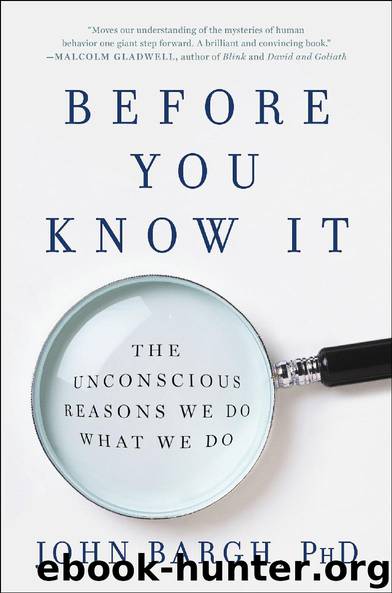Before You Know It by John Bargh Ph.D

Author:John Bargh, Ph.D.
Language: eng
Format: epub
Publisher: Touchstone
Rules for When to Trust Your Gut: 8
Our instincts about other people evolved in quite different times, of course, eons before the advent of social media, so what about meeting people over the Internet? Social life on the Internet is like the Wild West of American history, uncharted, somewhat lawless, often dangerous, and constantly changing. Can we trust our gut when it comes to people we meet online? Can we know who someone really is before we meet him in person?
“Can you see the real me? Can you? Can you?” sings Roger Daltrey in one of my favorite songs by the Who, written long before the Internet was invented, much less something you carried in your pocket. We’ve always packaged ourselves for public consumption, putting our best foot forward and hiding or camouflaging our faults as best we can. And we do so today in spades. Anyone who has ever been on Facebook or Instagram or any other social media knows that people spend a great deal of time carefully presenting upgraded versions of themselves that project images of lives that appear more perfect than they are. Sometimes these public personas are outright fictions, as in the practice of “catfishing.” Confiding our “real me,” who we really are inside, to another person takes a lot of trust, because doing so makes us quite vulnerable, especially if some of those parts of the “real me” are looked down upon by society or those around us.
Back in the Stone Age of the Internet—meaning the 1990s—researchers in human communications and social psychologists started to study how this new electronic way of interacting with others was affecting social life. Katelyn McKenna was one of the pioneers. In one groundbreaking series of studies she went undercover, taking the role of “participant observer,” gaining acceptance as a member of several electronic discussion boards, called newsgroups, covering a range of different topics. Back then it was not hard to participate in these anonymously, which enabled many people to join and participate in groups formed around topics that are called “stigmatized” interests. These could be political, like white supremacist groups, or sexual, such as cross-dressing or transvestism. But discussion groups also formed around more mundane specialized interests, like butterfly collecting, or Humphrey Bogart movies. People flocked to these forums because for many it was the first time they had found people who shared their interests. And especially for the stigmatized, socially frowned-upon interests—sexual proclivities such as cross-dressing or sadomasochism, political ones such as antigovernment militias or white supremacist groups—many of these people had spent their entire lives hiding that interest from not only their neighbors but in many cases also from their close friends and family, or even their spouse.
By infiltrating and participating in these groups, McKenna was able to gain the trust of the members. Then and only then, after many months and even years of participating, was she able to gather information from the members about how long they had been part of the group, how
Download
This site does not store any files on its server. We only index and link to content provided by other sites. Please contact the content providers to delete copyright contents if any and email us, we'll remove relevant links or contents immediately.
Rewire Your Anxious Brain by Catherine M. Pittman(18648)
Talking to Strangers by Malcolm Gladwell(13357)
The Art of Thinking Clearly by Rolf Dobelli(10467)
Mindhunter: Inside the FBI's Elite Serial Crime Unit by John E. Douglas & Mark Olshaker(9331)
Becoming Supernatural by Dr. Joe Dispenza(8209)
Change Your Questions, Change Your Life by Marilee Adams(7769)
Nudge - Improving Decisions about Health, Wealth, and Happiness by Thaler Sunstein(7697)
The Road Less Traveled by M. Scott Peck(7599)
The Lost Art of Listening by Michael P. Nichols(7500)
Mastermind: How to Think Like Sherlock Holmes by Maria Konnikova(7331)
Enlightenment Now: The Case for Reason, Science, Humanism, and Progress by Steven Pinker(7309)
Win Bigly by Scott Adams(7187)
The Way of Zen by Alan W. Watts(6608)
Daring Greatly by Brene Brown(6507)
Big Magic: Creative Living Beyond Fear by Elizabeth Gilbert(5768)
Grit by Angela Duckworth(5612)
Ego Is the Enemy by Ryan Holiday(5425)
Men In Love by Nancy Friday(5237)
The Laws of Human Nature by Robert Greene(5193)
